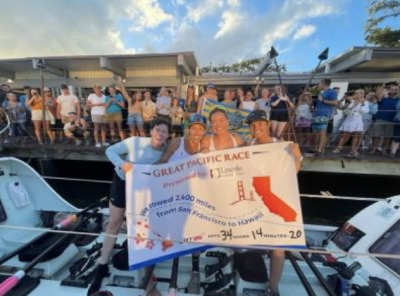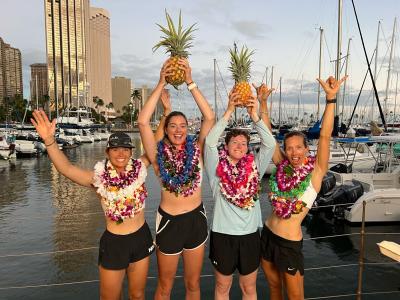Crossing an Ocean for Mental Health: Four Athletes Row to Support ADAA
 What do four female athletes who broke a world record rowing 2,400 nautical miles across the Pacific Ocean and people who suffer from depression, anxiety and co-occurring disorders have in common? At ADAA we pose this seemingly riddle-like question because at first, it was a mystery to us as well. But Lat35, an adventure racing company whose athletes reached out to us not too long ago to say they were donating proceeds from their race to our organization, were not joking. ADAA caught up with Sophia Denison-Johnston (aka DJ), Adrienne Smith, Libby Costello and Brooke Downes, dry and on land, to find out why their commitment to mental and emotional health was an important factor in their record-breaking almost 35-day rowboat journey from San Francisco to Honolulu.
What do four female athletes who broke a world record rowing 2,400 nautical miles across the Pacific Ocean and people who suffer from depression, anxiety and co-occurring disorders have in common? At ADAA we pose this seemingly riddle-like question because at first, it was a mystery to us as well. But Lat35, an adventure racing company whose athletes reached out to us not too long ago to say they were donating proceeds from their race to our organization, were not joking. ADAA caught up with Sophia Denison-Johnston (aka DJ), Adrienne Smith, Libby Costello and Brooke Downes, dry and on land, to find out why their commitment to mental and emotional health was an important factor in their record-breaking almost 35-day rowboat journey from San Francisco to Honolulu.
Taking turns rowing in two-hour shifts, not sleeping for more than 90-minutes at a time, eating dehydrated, instant, and packaged food, boiling their water, going to the bathroom in a bucket and maintaining their boat, safety, navigation and any medical needs, the team endured physically and psychologically exhausting conditions.
ADAA spoke with all four amazing athletes about how they literally and figuratively pushed and pulled through this arduous journey, maintained their positivity, stayed strong, supported each other, and why they chose to generously donate to support ADAA’s mission.
Commitment to Mental Health
DJ: ADAA aligned with our mission statement to help elevate each other’s greatness. Mental health is something that is close to all of us. Anxiety and depression are widespread; they’re important topics but there are a lot of not-so-credible resources floating around and we were looking for an organization that walked the walk, had a tangible impact, and was trustworthy. ADAA fit the bill – good female leadership, transparent, tangible work, credible information, and they help people find support and therapists.
Brooke: I know people personally who struggle with anxiety and depression. It affects their quality of life. Their anxiety is so bad they have to leave the room. As a friend trying to navigate that, organizations like ADAA are great, not just for them but for me as well.
Libby: The reality is we wanted to help people while doing this row. For me, I lost a teammate to suicide in college, and the next year, I lost a close friend, and I came out of that feeling emotionally numb and cynical and not seeing much of a future. And then this opportunity to do something new and cool came along. It was me committing to making a change in my life. Being able to make a decision and move forward, even if you don’t know exactly how, is so important.
Adrienne: For me, it’s about asking the question and I ask this often when I see it: is everything ok? It’s important to open that door, give someone that space and it’s ok if they’re not ok. There’s this message around oh, good vibes only, everywhere, all the time, and yeah, sure, I want good vibes, but I don’t have that capability all the time, especially if I don’t take care of myself. There was a lot of doubt and uncertainty and I thought, are we really going to do this? But you’re always going to have that one difficult thing and you don’t want to do it. All you can do is prepare.
 We’re All in the Same Boat
We’re All in the Same Boat
DJ: It was an experience where I was really forced to be honest with myself about who I am and what I can do and what I bring to the group. It’s really scary to be honest. We might find we don’t like who we are or we don’t like that we are not capable of doing something. But when you have support and love, you are able to move through. Shortcomings are not a bad thing, we all have them - they don’t make us bad people. They are opportunities to ask for support to get where we want to be. I wish that everyone in the world could understand the capacity that humans have and know it’s ok to have flaws. Doubts and fears are normal. We may feel terrible for a while and I’m ok with it and I’m still going to do it.
Adrienne: There were moments when I was aggravated and annoyed but there we were. It was a lesson for me in my life – it doesn’t just exist on the boat. But on the boat, I had the time and space to just sit there and be with that and deal with the frustration, the anxiousness, the ups and downs of emotions. Sit with myself and let it run its course. What would happen if we just sat with all the ways that we are uncomfortable? And thinking that way, for me, actually caused kind of a quicker shift in attitude and perspective because there is nowhere to run.
Brooke: How we dealt with life on the boat is the same as on land. I can’t help somebody until I help myself. I think of some of my friends, who are the most generous people but are struggling with anxiety and depression, always trying to help others but not getting the help they need, carrying the weight of everyone’s struggles… I get it. Our struggles may not be the same but we all struggle. I can understand.
Teamwork Makes the Reality Work
Adrienne: There’s something about being prepared together. What we created as a team, there was space held for you to deal with things and if you got anxious or depressed or anything, then you just be who you are. There was a lot of acceptance, and it was incredible and remarkable for me to be a witness to my own thoughts and self, and just be me. We had our frustrations and aggravations and sometimes we talked about them. Sometimes we sat with them, stewed on them and then we would share with each other later. And for some of the things I said to myself, can I do anything about it? Yes or no? And if it was no, well then whatever, here I was. But I was supported and loved and safe with this team.
Libby: There’s a team that’s far beyond the nuclear team. We had land support, a weather router, trainers, and access to our satellite phones. There were more people looking out for us than met the eye. Even though we were out there in the boat by ourselves, we still had a whole team supporting us.
DJ: When I’ve been at my lowest, it’s so hard to get help. To have a support network already built in when I’m down means I don’t have to summon the energy to ask for specific help. It’s already there to catch me when I fall. That’s what we created on the boat. We allowed each other to state our needs yet not feel like we had to fix each other all the time. Sometimes your teammate is in a bad mood or frustrated and my reaction was, it’s ok for you to be in a bad mood and you’re not bringing me down. You don’t have to pretend. I’ll be here when you’re ready. Just being present to the emotions, being forced to sit with discomfort sometimes is what you need. That’s real.

An Ally
It's obvious that these four women are incredible athletes, but they stress that you don’t need to be an Olympian or break world records to tackle and overcome mental health issues. Their decision to support ADAA came from wanting to find an organization that does good work, and for that, we are thankful. But we are also grateful for their understanding, compassion, and commitment to the reality of mental health struggles, whether personally or through others in their lives. Driven, or should we say rowed, by human connection and partnership, this team – on land or at sea – are a real ally to ADAA.
Photos courtesy of The Great Pacific Race
Follow the Team:
Support ADAA with Lat35:
Media Coverage:
- Kelly Clarkson Show, September 22, 2022
- Vogue September Issue, July 25, 2022
- ABC 7 Eyewitness News, July 26, 2022
- Inside Edition, July 26, 2022
- Yahoo News, July 27, 2022
- GAS Hour 2 (podcast), July 28, 2022
- Kron 4, July 29, 2022
- Fox News, July 30, 2022
- BBC News, August 2022
- On Air with Ryan Seacrest, Aug 3, 2022
- Khon 2, Aug 3, 2022
- Sports Illustrated Swimsuit, Aug 4, 2022
- News Channel, Aug 4, 2022
Share Your Story and Voice and Help #breakthestigma Around Mental Health
Support ADAA's Mission - Every Gift Makes an Impact



















